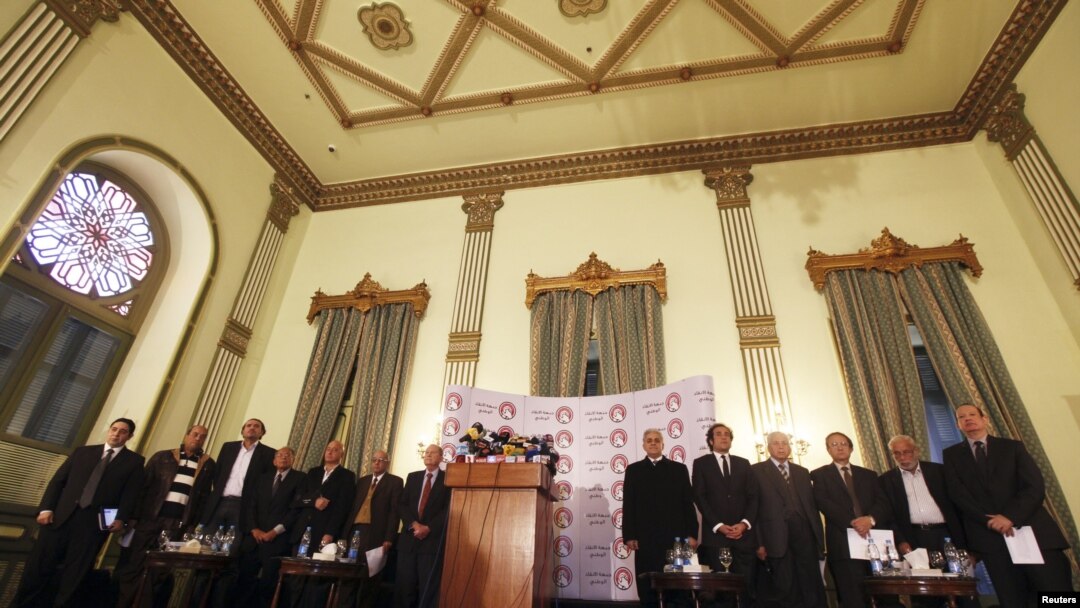Egypt's liberal opposition coalition says it will keep fighting an Islamist-backed constitution despite its apparent approval in a two-stage referendum.
In a Cairo news conference Sunday, the National Salvation Front said it has asked electoral authorities to investigate irregularities in the referendum, which ended Saturday with voting in 17 of Egypt's 27 provinces. Voting began in the other provinces on December 15.
The Muslim Brotherhood movement of President Mohamed Morsi says unofficial results show the constitution won approval from 64 percent of voters in the two rounds, with Saturday's "yes" vote being even higher at 71 percent.
The electoral commission could announce official results as early as Monday.
The opposition says the lack of judicial supervision of the referendum led to rigging and intimidation of voters by Islamists. Many judges boycotted the process to protest President Morsi's recent attempts to put his decisions above the law.
Activists also say the constitution lacks a popular mandate, because only about one-third of the electorate voted on it.
National Salvation Front member Amr Hamzawy said the charter is not legitimate.
"It violates our basic rights, social and economic before civil and personal rights," said Hamzawy. "It violates our interests and the popular interest in building a socially just society and a democratic system. And we will continue to attempt to bring down the constitution peacefully and democratically."
Islamists said the referendum was fair and represents a crucial step in Egypt's transition to democracy, almost two years after a popular uprising ousted longtime president Hosni Mubarak.
An Islamist-dominated assembly finalized the draft constitution last month after liberals and Christians walked out, complaining their views were being ignored.
Opposition groups fear the charter will erode civil liberties, because it increases the role of Islamic law in society and does not explicitly mention the rights of women or minorities.
Islamist and opposition groups had staged a series of mass protests for and against the constitution in recent weeks. Some members of the rival groups engaged in violent street battles that killed eight people outside the presidential palace in Cairo.
If Egypt's electoral commission confirms the passage of the referendum, an election would be held for a new lower house of parliament in two months.
In a Cairo news conference Sunday, the National Salvation Front said it has asked electoral authorities to investigate irregularities in the referendum, which ended Saturday with voting in 17 of Egypt's 27 provinces. Voting began in the other provinces on December 15.
The Muslim Brotherhood movement of President Mohamed Morsi says unofficial results show the constitution won approval from 64 percent of voters in the two rounds, with Saturday's "yes" vote being even higher at 71 percent.
The electoral commission could announce official results as early as Monday.
Egypt's Draft Constitution
Egypt's Draft Constitution- Limits president to two four-year terms
- Provides protections against arbitrary detention and torture
- Islamic law, or Sharia, serves as the basis for legislation
- Religious freedom is limited to Muslims, Christians and Jews
- Citizens are deemed equal before the law and equal in rights
Activists also say the constitution lacks a popular mandate, because only about one-third of the electorate voted on it.
National Salvation Front member Amr Hamzawy said the charter is not legitimate.
"It violates our basic rights, social and economic before civil and personal rights," said Hamzawy. "It violates our interests and the popular interest in building a socially just society and a democratic system. And we will continue to attempt to bring down the constitution peacefully and democratically."
Islamists said the referendum was fair and represents a crucial step in Egypt's transition to democracy, almost two years after a popular uprising ousted longtime president Hosni Mubarak.
An Islamist-dominated assembly finalized the draft constitution last month after liberals and Christians walked out, complaining their views were being ignored.
Opposition groups fear the charter will erode civil liberties, because it increases the role of Islamic law in society and does not explicitly mention the rights of women or minorities.
Islamist and opposition groups had staged a series of mass protests for and against the constitution in recent weeks. Some members of the rival groups engaged in violent street battles that killed eight people outside the presidential palace in Cairo.
If Egypt's electoral commission confirms the passage of the referendum, an election would be held for a new lower house of parliament in two months.
Some information for this report was provided by AP, AFP and Reuters.


